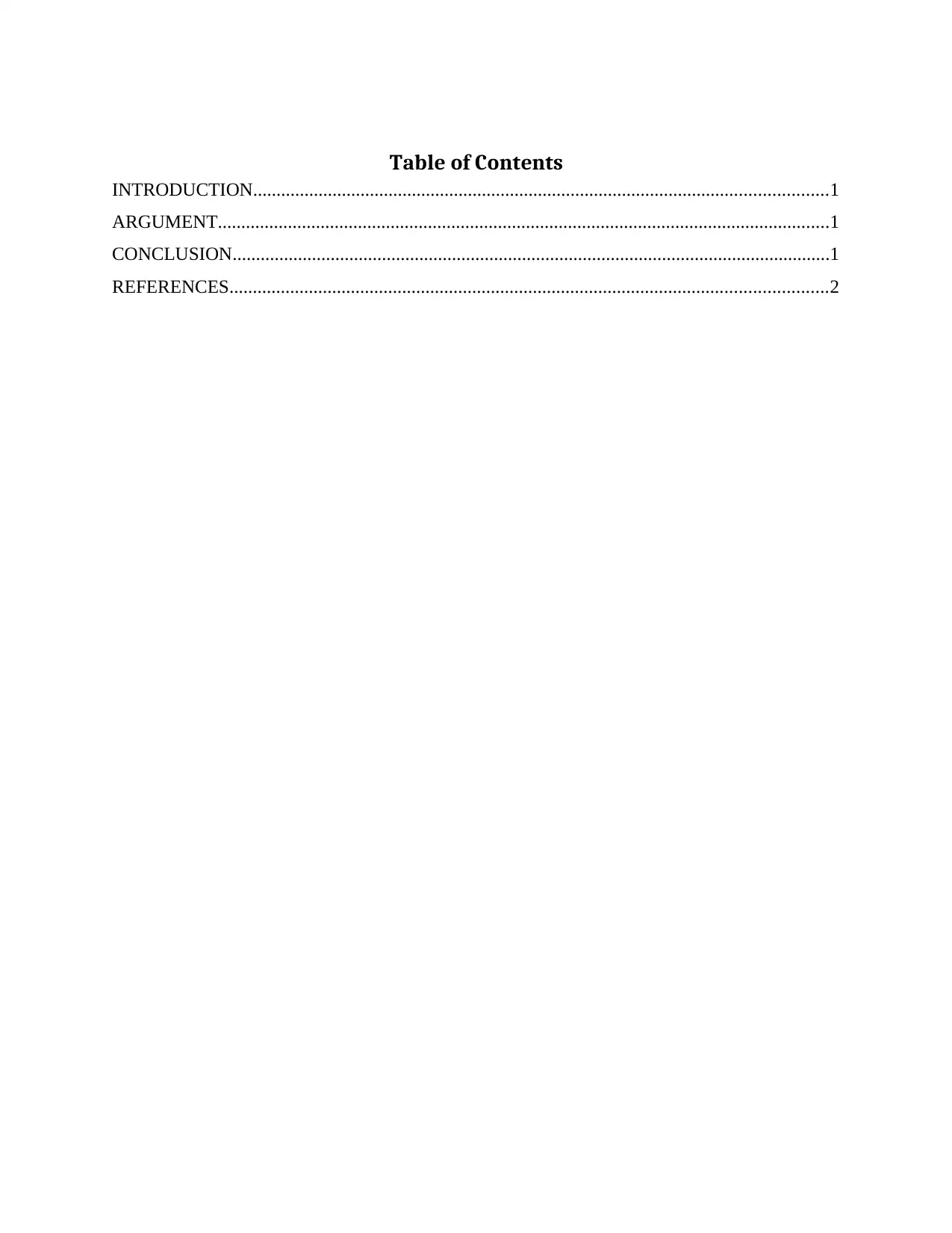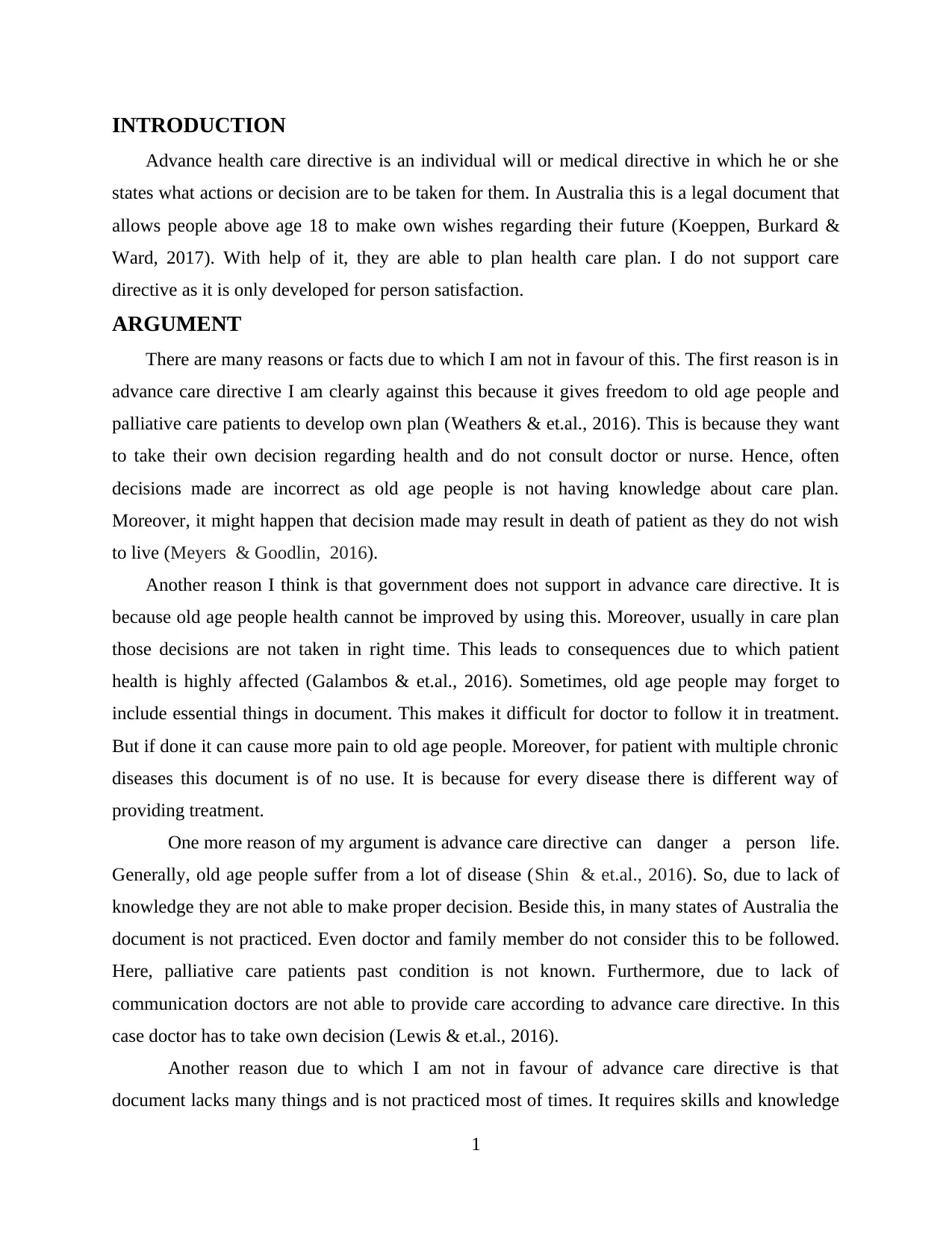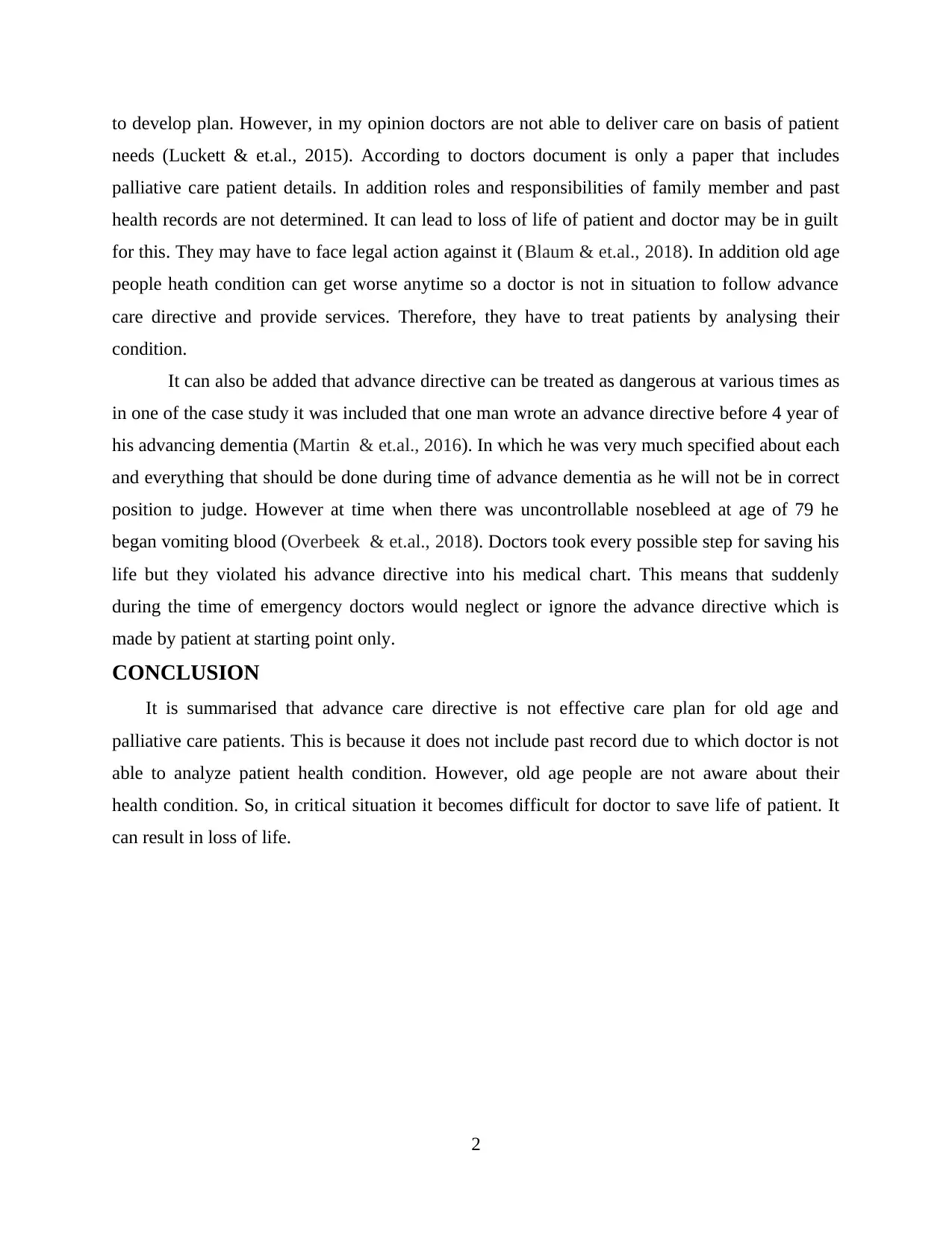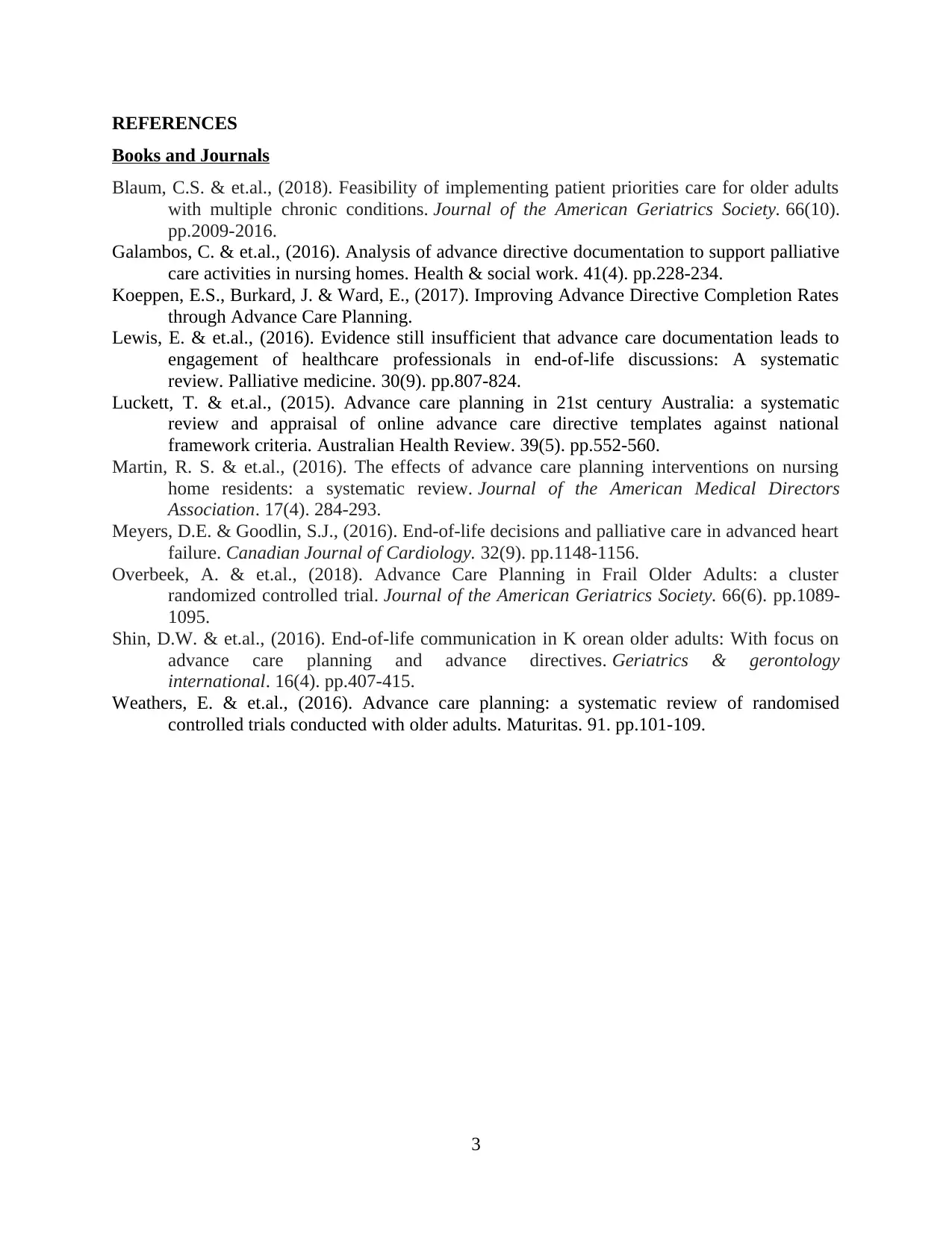Argument Against Advance Health Care Directives in Healthcare
VerifiedAdded on 2021/02/20
|5
|1265
|32
Report
AI Summary
This report presents a detailed argument against the use of advance health care directives, particularly in the context of Australia. The author contends that these directives, while intended to empower individuals in making end-of-life decisions, are often flawed and potentially detrimental. The argument focuses on several key points: the lack of medical knowledge among elderly individuals, the potential for incorrect decisions leading to negative health outcomes, and the limited government support for these directives. The report also highlights the challenges doctors face in adhering to these directives, especially when dealing with patients with multiple chronic diseases or during emergency situations. Furthermore, the author raises concerns about the document's practicality, the lack of skills and knowledge required to develop a proper plan, and the potential for legal complications. The author concludes that advance care directives are not an effective care plan for old age and palliative care patients and can result in loss of life.

DEBATE OR ARGUEMENT ON
CURRENT HEALTH CARE
CURRENT HEALTH CARE
Paraphrase This Document
Need a fresh take? Get an instant paraphrase of this document with our AI Paraphraser

Table of Contents
INTRODUCTION...........................................................................................................................1
ARGUMENT...................................................................................................................................1
CONCLUSION................................................................................................................................1
REFERENCES................................................................................................................................2
INTRODUCTION...........................................................................................................................1
ARGUMENT...................................................................................................................................1
CONCLUSION................................................................................................................................1
REFERENCES................................................................................................................................2

INTRODUCTION
Advance health care directive is an individual will or medical directive in which he or she
states what actions or decision are to be taken for them. In Australia this is a legal document that
allows people above age 18 to make own wishes regarding their future (Koeppen, Burkard &
Ward, 2017). With help of it, they are able to plan health care plan. I do not support care
directive as it is only developed for person satisfaction.
ARGUMENT
There are many reasons or facts due to which I am not in favour of this. The first reason is in
advance care directive I am clearly against this because it gives freedom to old age people and
palliative care patients to develop own plan (Weathers & et.al., 2016). This is because they want
to take their own decision regarding health and do not consult doctor or nurse. Hence, often
decisions made are incorrect as old age people is not having knowledge about care plan.
Moreover, it might happen that decision made may result in death of patient as they do not wish
to live (Meyers & Goodlin, 2016).
Another reason I think is that government does not support in advance care directive. It is
because old age people health cannot be improved by using this. Moreover, usually in care plan
those decisions are not taken in right time. This leads to consequences due to which patient
health is highly affected (Galambos & et.al., 2016). Sometimes, old age people may forget to
include essential things in document. This makes it difficult for doctor to follow it in treatment.
But if done it can cause more pain to old age people. Moreover, for patient with multiple chronic
diseases this document is of no use. It is because for every disease there is different way of
providing treatment.
One more reason of my argument is advance care directive can danger a person life.
Generally, old age people suffer from a lot of disease (Shin & et.al., 2016). So, due to lack of
knowledge they are not able to make proper decision. Beside this, in many states of Australia the
document is not practiced. Even doctor and family member do not consider this to be followed.
Here, palliative care patients past condition is not known. Furthermore, due to lack of
communication doctors are not able to provide care according to advance care directive. In this
case doctor has to take own decision (Lewis & et.al., 2016).
Another reason due to which I am not in favour of advance care directive is that
document lacks many things and is not practiced most of times. It requires skills and knowledge
1
Advance health care directive is an individual will or medical directive in which he or she
states what actions or decision are to be taken for them. In Australia this is a legal document that
allows people above age 18 to make own wishes regarding their future (Koeppen, Burkard &
Ward, 2017). With help of it, they are able to plan health care plan. I do not support care
directive as it is only developed for person satisfaction.
ARGUMENT
There are many reasons or facts due to which I am not in favour of this. The first reason is in
advance care directive I am clearly against this because it gives freedom to old age people and
palliative care patients to develop own plan (Weathers & et.al., 2016). This is because they want
to take their own decision regarding health and do not consult doctor or nurse. Hence, often
decisions made are incorrect as old age people is not having knowledge about care plan.
Moreover, it might happen that decision made may result in death of patient as they do not wish
to live (Meyers & Goodlin, 2016).
Another reason I think is that government does not support in advance care directive. It is
because old age people health cannot be improved by using this. Moreover, usually in care plan
those decisions are not taken in right time. This leads to consequences due to which patient
health is highly affected (Galambos & et.al., 2016). Sometimes, old age people may forget to
include essential things in document. This makes it difficult for doctor to follow it in treatment.
But if done it can cause more pain to old age people. Moreover, for patient with multiple chronic
diseases this document is of no use. It is because for every disease there is different way of
providing treatment.
One more reason of my argument is advance care directive can danger a person life.
Generally, old age people suffer from a lot of disease (Shin & et.al., 2016). So, due to lack of
knowledge they are not able to make proper decision. Beside this, in many states of Australia the
document is not practiced. Even doctor and family member do not consider this to be followed.
Here, palliative care patients past condition is not known. Furthermore, due to lack of
communication doctors are not able to provide care according to advance care directive. In this
case doctor has to take own decision (Lewis & et.al., 2016).
Another reason due to which I am not in favour of advance care directive is that
document lacks many things and is not practiced most of times. It requires skills and knowledge
1
⊘ This is a preview!⊘
Do you want full access?
Subscribe today to unlock all pages.

Trusted by 1+ million students worldwide

to develop plan. However, in my opinion doctors are not able to deliver care on basis of patient
needs (Luckett & et.al., 2015). According to doctors document is only a paper that includes
palliative care patient details. In addition roles and responsibilities of family member and past
health records are not determined. It can lead to loss of life of patient and doctor may be in guilt
for this. They may have to face legal action against it (Blaum & et.al., 2018). In addition old age
people heath condition can get worse anytime so a doctor is not in situation to follow advance
care directive and provide services. Therefore, they have to treat patients by analysing their
condition.
It can also be added that advance directive can be treated as dangerous at various times as
in one of the case study it was included that one man wrote an advance directive before 4 year of
his advancing dementia (Martin & et.al., 2016). In which he was very much specified about each
and everything that should be done during time of advance dementia as he will not be in correct
position to judge. However at time when there was uncontrollable nosebleed at age of 79 he
began vomiting blood (Overbeek & et.al., 2018). Doctors took every possible step for saving his
life but they violated his advance directive into his medical chart. This means that suddenly
during the time of emergency doctors would neglect or ignore the advance directive which is
made by patient at starting point only.
CONCLUSION
It is summarised that advance care directive is not effective care plan for old age and
palliative care patients. This is because it does not include past record due to which doctor is not
able to analyze patient health condition. However, old age people are not aware about their
health condition. So, in critical situation it becomes difficult for doctor to save life of patient. It
can result in loss of life.
2
needs (Luckett & et.al., 2015). According to doctors document is only a paper that includes
palliative care patient details. In addition roles and responsibilities of family member and past
health records are not determined. It can lead to loss of life of patient and doctor may be in guilt
for this. They may have to face legal action against it (Blaum & et.al., 2018). In addition old age
people heath condition can get worse anytime so a doctor is not in situation to follow advance
care directive and provide services. Therefore, they have to treat patients by analysing their
condition.
It can also be added that advance directive can be treated as dangerous at various times as
in one of the case study it was included that one man wrote an advance directive before 4 year of
his advancing dementia (Martin & et.al., 2016). In which he was very much specified about each
and everything that should be done during time of advance dementia as he will not be in correct
position to judge. However at time when there was uncontrollable nosebleed at age of 79 he
began vomiting blood (Overbeek & et.al., 2018). Doctors took every possible step for saving his
life but they violated his advance directive into his medical chart. This means that suddenly
during the time of emergency doctors would neglect or ignore the advance directive which is
made by patient at starting point only.
CONCLUSION
It is summarised that advance care directive is not effective care plan for old age and
palliative care patients. This is because it does not include past record due to which doctor is not
able to analyze patient health condition. However, old age people are not aware about their
health condition. So, in critical situation it becomes difficult for doctor to save life of patient. It
can result in loss of life.
2
Paraphrase This Document
Need a fresh take? Get an instant paraphrase of this document with our AI Paraphraser

REFERENCES
Books and Journals
Blaum, C.S. & et.al., (2018). Feasibility of implementing patient priorities care for older adults
with multiple chronic conditions. Journal of the American Geriatrics Society. 66(10).
pp.2009-2016.
Galambos, C. & et.al., (2016). Analysis of advance directive documentation to support palliative
care activities in nursing homes. Health & social work. 41(4). pp.228-234.
Koeppen, E.S., Burkard, J. & Ward, E., (2017). Improving Advance Directive Completion Rates
through Advance Care Planning.
Lewis, E. & et.al., (2016). Evidence still insufficient that advance care documentation leads to
engagement of healthcare professionals in end-of-life discussions: A systematic
review. Palliative medicine. 30(9). pp.807-824.
Luckett, T. & et.al., (2015). Advance care planning in 21st century Australia: a systematic
review and appraisal of online advance care directive templates against national
framework criteria. Australian Health Review. 39(5). pp.552-560.
Martin, R. S. & et.al., (2016). The effects of advance care planning interventions on nursing
home residents: a systematic review. Journal of the American Medical Directors
Association. 17(4). 284-293.
Meyers, D.E. & Goodlin, S.J., (2016). End-of-life decisions and palliative care in advanced heart
failure. Canadian Journal of Cardiology. 32(9). pp.1148-1156.
Overbeek, A. & et.al., (2018). Advance Care Planning in Frail Older Adults: a cluster
randomized controlled trial. Journal of the American Geriatrics Society. 66(6). pp.1089-
1095.
Shin, D.W. & et.al., (2016). End‐of‐life communication in K orean older adults: With focus on
advance care planning and advance directives. Geriatrics & gerontology
international. 16(4). pp.407-415.
Weathers, E. & et.al., (2016). Advance care planning: a systematic review of randomised
controlled trials conducted with older adults. Maturitas. 91. pp.101-109.
3
Books and Journals
Blaum, C.S. & et.al., (2018). Feasibility of implementing patient priorities care for older adults
with multiple chronic conditions. Journal of the American Geriatrics Society. 66(10).
pp.2009-2016.
Galambos, C. & et.al., (2016). Analysis of advance directive documentation to support palliative
care activities in nursing homes. Health & social work. 41(4). pp.228-234.
Koeppen, E.S., Burkard, J. & Ward, E., (2017). Improving Advance Directive Completion Rates
through Advance Care Planning.
Lewis, E. & et.al., (2016). Evidence still insufficient that advance care documentation leads to
engagement of healthcare professionals in end-of-life discussions: A systematic
review. Palliative medicine. 30(9). pp.807-824.
Luckett, T. & et.al., (2015). Advance care planning in 21st century Australia: a systematic
review and appraisal of online advance care directive templates against national
framework criteria. Australian Health Review. 39(5). pp.552-560.
Martin, R. S. & et.al., (2016). The effects of advance care planning interventions on nursing
home residents: a systematic review. Journal of the American Medical Directors
Association. 17(4). 284-293.
Meyers, D.E. & Goodlin, S.J., (2016). End-of-life decisions and palliative care in advanced heart
failure. Canadian Journal of Cardiology. 32(9). pp.1148-1156.
Overbeek, A. & et.al., (2018). Advance Care Planning in Frail Older Adults: a cluster
randomized controlled trial. Journal of the American Geriatrics Society. 66(6). pp.1089-
1095.
Shin, D.W. & et.al., (2016). End‐of‐life communication in K orean older adults: With focus on
advance care planning and advance directives. Geriatrics & gerontology
international. 16(4). pp.407-415.
Weathers, E. & et.al., (2016). Advance care planning: a systematic review of randomised
controlled trials conducted with older adults. Maturitas. 91. pp.101-109.
3
1 out of 5
Related Documents
Your All-in-One AI-Powered Toolkit for Academic Success.
+13062052269
info@desklib.com
Available 24*7 on WhatsApp / Email
![[object Object]](/_next/static/media/star-bottom.7253800d.svg)
Unlock your academic potential
Copyright © 2020–2026 A2Z Services. All Rights Reserved. Developed and managed by ZUCOL.





